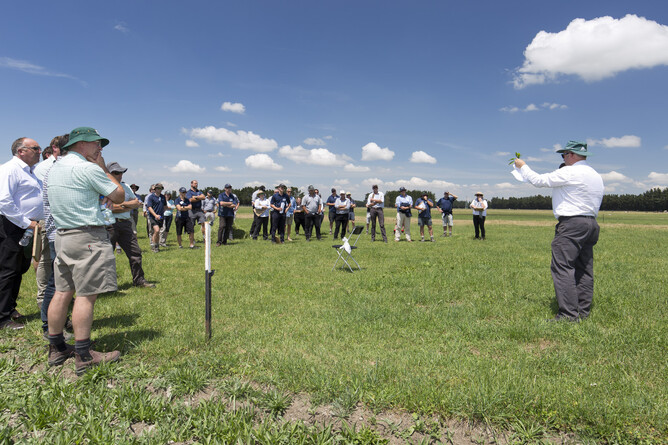Around 150 industry stakeholders, seed retailers and farmers attended an on-farm event to hear the latest research findings on Ecotain, a plantain cultivar that research has found acts environmentally to significantly reduce nitrogen leaching.
Representatives from seed retailers Fonterra FarmSource, PGG Wrightson, Farmlands, dairy supplier Synlait, and other industry representatives gathered at Marshdale Farm in Oxford, Canterbury last week to hear about the science and practical application of Ecotain from researchers at Agricom, Plant & Food Research, and Lincoln and Massey universities.
The science
In September this year, proprietary seed company Agricom announced research findings that showed Ecotain can significantly reduce nitrogen leaching from urine patches on livestock farms. Most nitrogen leaching from livestock farms comes from the urine patch, an area containing high concentrations of nitrogen from cows’ urine.
Alongside researchers at Lincoln and Massey universities and Plant & Food Research, Agricom found that Ecotain, a specific environmental plantain cultivar, can function in pasture systems to reduce nitrogen leaching in four ways. It increases the volume of cows’ urine which dilutes the concentration of nitrogen, it reduces the total amount of dietary nitrogen in animals’ urine, it delays the process of turning ammonium into nitrate in the urine patch, and it restricts the accumulation of nitrate in soils growing Ecotain. In Agricom’s nitrogen management system NSentinel 4, these four mechanisms of activity are referred to as dilute, reduce, delay, restrict.
At the event, Massey University’s Professor Peter Kemp presented his team’s preliminary findings on the farm-scale impact of Ecotain, saying their findings so far show a minimum reduction of nitrate leaching from the urine patch of 30 per cent from pastures containing Ecotain.
Professor Kemp and his team are part way through a two-year trial measuring the nitrate reducing capabilities of Ecotain on 60 dairy cows grazing three different paddock types: ryegrass/clover, Ecotain/clover, and Ecotain.
Professor Kemp says the 30 per cent figure is achieved through the dilution of nitrogen in the urine as a result of Ecotain’s bioactive compounds creating a diuretic effect in livestock.
“If you then add to that the additional nitrogen-reducing capabilities of Ecotain, you would likely get an increased reduction in nitrate leaching, with some of the lysimeter studies from Lincoln University having shown a reduction in leaching from the urine patch by as much as 89 per cent,” he says.
Establishing and grazing Ecotain
Agricom’s product development specialist Allister Moorhead says plantain has been used in pasture in New Zealand for many years, with widespread uptake by farmers from about 2010. It became favoured for its high summer yield and cool season activity.
Officially deemed a grazing herb, plantain began life as a common flat weed (Plantago lanceloata), which Agricom bred and commercialised into a successful cultivar. The resulting plantain, Ecotain, works environmentally to decrease nitrogen leaching from the urine patch.
Mr Moorhead says Ecotain can be used in pasture in a number of ways, in either a pure sward or in a mixed pasture system. “Ecotain works well in a special purpose crop, where Ecotain, and often clover, are the only seeds sown, and in a grass/clover/Ecotain mix.
“Ecotain is highly complementary in a mixed pasture system, providing a good balance of seasonal production and summer quality, as well as being a good source of micronutrients such as copper and selenium.”
Agricom science lead Dr Glenn Judson says Ecotain is easy for animals to graze due to its upright growth and broad leaves.
“We’re seeing in our experiments that animals are eating more Ecotain than, for example, grass, throughout the day because it’s very easy to graze,” he told the event. “Ecotain also breaks down quickly in the gut, so animals can eat more of it.”
Ongoing research
A panel discussion with Dr Judson, Professor Kemp, Lincoln University’s Professor Grant Edwards and Plant & Food Research’s Dr Trish Fraser outlined each institution’s ongoing research, including looking at the nitrogen reducing capabilities of Ecotain across a range of farm systems.
Dr Fraser says her team are focusing on learning more about Ecotain’s bioactive compounds and the specific role they play in inhibiting nitrification in the soil. Preliminary results from their trial is expected early 2018.
Professor Edwards said Lincoln University’s current full farm systems trial is measuring the effectiveness of Ecotain across 100 cows in a variety of pasture mixes. The trial started in spring 2017 and early data is expected late 2018.
Alex Mowat, who farms 700 dairy cows in Hinds, Canterbury, says Ecotain is a positive step for farmers.
“It’s encouraging to see the amount of effort being made by industry to mitigate the negative environmental effects of nitrogen leaching. As new technology like this starts to become available, and is proven to work, I think we’ll see more farmers jump on board.”
The Ecotain story
In 2015 Agricom developed the Greener Pastures Project (GPP), which combined the research and expertise from Massey and Lincoln universities and Plant & Food Research. The GPP has a series of peer-reviewed scientific papers to support the NSentinel 4 concept and Ecotain, and runs parallel with the DairyNZ-led Forages for Reduced Nitrate Leaching (FRNL) which aims to reduce nitrate leaching losses by 20 per cent by delivering proven, adaptable and profitable pasture and forage crop options.
